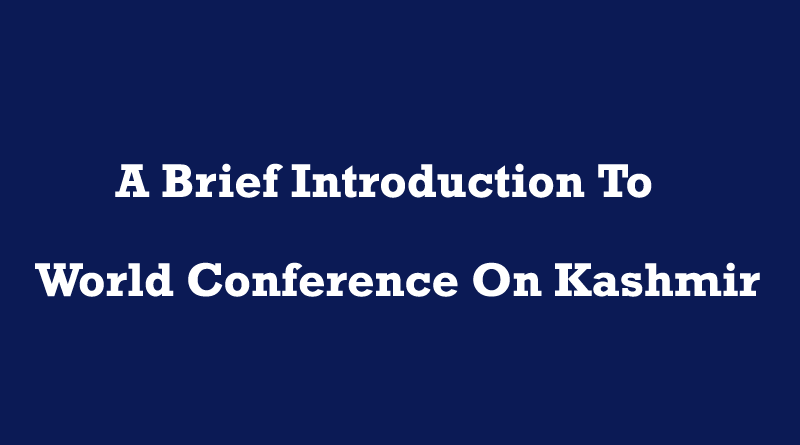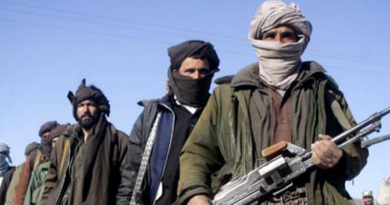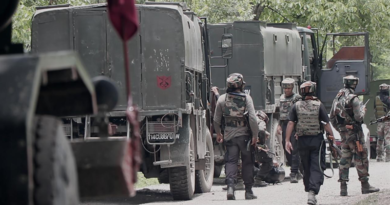A Brief Introduction to: World Conference on Kashmir
A Brief Introduction to:
World Conference on Kashmir
ADVANCING THE CAUSE OF ISLAM
1: Mahazi-Islami, Occupied Kashmir, in collaboration with Al-Ansar, UK is organising a one-day world Conference on Kashmir in July, 2000 in London. A conference paper entitled ‘A Case for Holding World Conference on Kashmir’ describing, in some detail, the need, objectives and the themes for discussion, has been written by Dr Syed Inayatullah Andrabi, Convenor-in-exile, Mahazi-Islami, Occupied Kashmir, and is available on request. The conference will be the first of its kind, in the sense that it will seek to focus on the issues instead of mere events (Indian excesses or the heroic acts of mujahideen) in a non-partisan and rational way. The whole gamut of issues, with all their dimensions—historical, security-strategic, civilizational—- underlying the Kashmir problem, will be subjected to a rational debate, with an aim of developing a vision for future. The fact that Kashmir problem is integrally linked to the recent sub-continental political history, cannot be over emphasized, it is therefore, natural that while discussing Kashmir we are essentially subjecting the whole ideological baggage—Indian nationalism, two-nation theory, etc.etc.—- to intellectual scrutiny, and this is long overdue.
2: There are three main objectives the conference will seek to achieve. Briefly put, these are:
a) To create an awareness among the Muslim Ummah in general that Kashmir is not a Pakistani, subcontinental, Mirpuri or a regional issue; it represents the conflict between Islam and Kufr in the post-47 South Asia, and as long as India holds on to Kashmir, it symbolises India’s upper hand in this conflict.
b) To seriously attempt to bring about a change in Pakistan’s Kashmir policy. Pakistan should take up Kashmir as its own issue, one that is linked to its very being. After all Kashmir issue in its post-47 phase precisely refers to that. This will legitimize the price that Pakistan should firmly decide it is ready to pay for reclaiming Kashmir, and unless that crucial decision is not made, Kashmir’s liberation will never come about, only a full generation of young Islamic youth of Kashmir will perish. India has decided the price, and is therefore able to keep Kashmir. The myth of West ever coming to support an ‘indigenous movement for self-determination in Kashmir supported by Pakistan’ (this is how at present Pakistan officially characterizes the Movement in Kashmir and its role there) has to be forcefully demolished once and for all. The support may or may not come, but it must not remain the basic premise. If Kashmir issue means denial of the right of self-determination for Kashmiri people, it means something more serious to the state and the people of Pakistan, and the Muslim Ummah at large. It represents a heinous conspiracy to undo the idea of Pakistan and defeat the consolidation of Muslim political power in post-British South Asia. Pakistan, more than supporting the right of Kashmiri people and their movement to secure it, should take up its ‘own Kashmir issue’, namely, the case that it has been deprived, through fraud and sheer force, of a vital constituent part of it, the Muslim majority state of Jammu and Kashmir. What if India was similarly deprived of Nizam’s Hyedrabad in 1947? Would it have chosen to wait for the people there to exercise their right of self-determination, convince the ‘international community’ of its ‘just’ cause, or attend to the more urgent task of putting the bits and pieces together and completing the nascent political entity, India. For Muslim league under Quaid, the issue of Kashmir had to be taken up with British colonial rulers and the Indian Congress leadership, but after 47, it is the state of India with whom Pakistan should take up the issue in the most direct, unambiguous and straightforward way.
c) To empower the genuine forces involved in the ongoing Movement in and outside Kashmir by providing them the power of argument and a moral-intellectual inspiration and support.
3: The Conference should aim at breaking a fresh ground in the overall thinking on Kashmir—-the issue, the solution, and the methods. Following themes can, therefore, be selected for deliberation at the conference.
a) Kashmir Issue: What is Kashmir issue? A lot of confusion surrounds this basic question. Quite often, we come across the statements that Kashmir problem is not a border dispute between two states, it is the question of the basic right of self-determination of seventeen million Kashmiri people. Kashmir issue has come to refer to a ‘problem’ a small population in a remote corner of the world is facing. There can be more than one projection of what the problem is: denial of basic freedoms under autocratic rule, denial of the right of self determination; the erosion of the distinct identity ‘kashmiriyat’ of Kashmiris by the Indian rule; alienation of people from India because of misrule or atrocities etc etc.—Kashmir problem has meant all these things at various points in time right from early 30s—- , but the common denominator here is that it is a local problem faced by Kashmiris.Now, untill 47 this could be true, wholly or partly, but after that it is neither wholly nor partly true, it is absolutely untrue: Kashmir issue is not essentially a problem of a local people; they are no doubt its first victims, but as a racial/cultural community they are incidental to the real problem, which is basically the determination of Brahmin-led Hindus to defeat the emergence and consolidation of Muslim political power in the post-British subcontinent, and ensure their own political/cultural hegemony in the region. Islam, therefore, is central to the whole affair here. If India has grabbed Kashmir, and is not allowing a referendum there, it is not because of Kashmiris being a particular racial/cultural group, but in fighting Islam it considers it necessary. Kashmir issue, therefore, represents and symbolizes the basic conflict in post-British south Asia, namely the conflict between Islam and Brahmin-led Hinduism (a local hostile environment of Islam that has not been adequately researched, analyzed and described so far). Here the Kashmiri Muslims are as much a party in this conflict as are other Muslims, and as is Pakistan. One must note here that this is the standard practice of the enemies of Islam, they did the same thing to Palestine: reduced it to a local problem faced by Palestinian people with Al-Quds a local village shrine and Yasser Arafat an aspirant for its sajada nishini.
b) Solution of the problem: For the most part in the history of Kashmir dispute, implementation of UNSC resolutions which allow the Kashmiri people to choose between India and Pakistan, has remained the most talked-about and widely favoured way of solving the problem. However, with the emergence of the present movement in 1989, a flood of literature has appeared, particularly in the West(UK for example) dealing with this subject. Some have argued against the hitherto generally accepted solution of UN resolutions giving a host of ‘reasons’, whereas some have suggested new solutions, like for example, a Northern Ireland-type solution. There has been endorsement or rejection of these suggestions from concerned quarters, but by and large these reactions reflect party-positions of these quarters. What is now badly needed is a thorough, non-partisan appraisal of all these emerging suggestions regarding the solution of Kashmir conflict, and the identification of those basic criteria, which a right solution to the conflict must necessarily satisfy.
c) Pakistan’s role in the genesis of Kashmir conflict and later in its resolution needs to be brought into sharp focus. A comprehensive debate is required to critically examine Pakistan’s Kashmir policy right from the beginning. This should be done with a forward looking and constructive approach—to make Pakistan’s Kashmir involvement more effective and productive in future.
d) The strategic realities of the region need to be thoroughly analyzed and their implication for the Kashmir solution need to be properly deliberated at the Conference. Indo-US relation is one of the most significant strategic reality of the region. This is not essentially a new one—-India has always been regarded by the West as its favourite counterweight against China—–but in the changing circumstances this reality is emerging very prominently, particularly after the Kargil episode. This reality needs to be examined from close and its implication for Islam in South-Central Asia in the short, medium and long-term need to be worked out in detail. Being important in its own right, it becomes more important in view of the fact that the present Kashmir movement in and outside Kashmir looks too much towards the West, trying to ultimately seek its mediation in the dispute.
e) The current Indo-US relationship should be viewed in the wider historical perspective of the West-India relationship since 47. There is an opinion that Pakistan should sort out its disputes with India in a bilateral way, without bringing US or any other power in. This will mean that, in its political or military fight, it is basically India that Pakistan has to face. One would expect that in such an Indo-Pak confrontation where the mutual/bilateral disputes are being sorted out, the West will stand neutral, and allow the two warring parties to test their strength. However, this has not been the case so far: West has chosen to remain silent or has made a direct intervention to the detriment of Pakistan: in 1971 it allowed India, by its silence, to militarily intervene in East Pakistan; In 1947 it prevented Jinnah (Gen. Gracey threatening to resign) to send armed forces to Kashmir to fight Indian army there, and, fifty two years later, in a striking similarity, it, by direct intervention, prevented Nawaz Sharif to go ahead with Kargil operation against India. This suggests that the post-47 political order in the sub-continent with India as the predominant power and Kashmir divided between the two, is a deliberate arrangement, and the West—Britain in 47 and US now—will not allow this status-quo to be altered militarily, at least in Pakistan’s favour. Both, Gen. Gracy’s threat of resignation in 47 as well as Clinton’s act of stopping Nawaz Sharif 52 years later, amount to one and the same policy—-not allowing Pakistan to change the staus-quo militarily. This strategic reality leads to an important conclusion about Kashmir: For the liberation of Kashmir from India to happen, a ruling regime in Pakistan that is independent, at least, in its dealings with India, (not influenced by West in this regard) is an essential prerequisite.
f) Whenever one talks of the liberation of Kashmir from India, the question of Indian Muslims crops up. This is entirely understandable. However, the present Muslim situation in India, has come about as a result of a long historical process that culminated in the emergence of Pakistan in 1947. Any serious attempt to develop some kind of vision or agenda for the 200m strong Muslim community in India, requires a thorough revisiting of 1947. There are so many either-or frameworks into which Indian Muslim thinking remains straitjacketed, and no emancipation is possible without fully digging into the pre-47 Muslim political thought. This requires a full conference in its own right. However, a conference dealing with Kashmir should somehow encompass some basic questions relating to the future of Indian Muslims.
***
Dr. Syed M Inayatullah Andrabi is a well-known figure in the circles of political Islam. Born in Srinagar, the capital city of Indian Held Kashmir, Dr Andrabi has been intimately involved at the intellectual level with the global politics and political issues since his student days in 1980 at Pune (India), where he completed his Ph.D. in Linguistics in 1983 at the Centre of Advanced Study in Linguistics, Deccan College, University of Pune, Pune, India. Upon completing his doctorate he returned home to join the University of Kashmir, first on a post-doctoral fellowship and later as faculty, but could not continue because of the deteriorating security situation in Kashmir, and had to move to United Kingdom in 1994 where he continues to live since along with his wife and five children.




